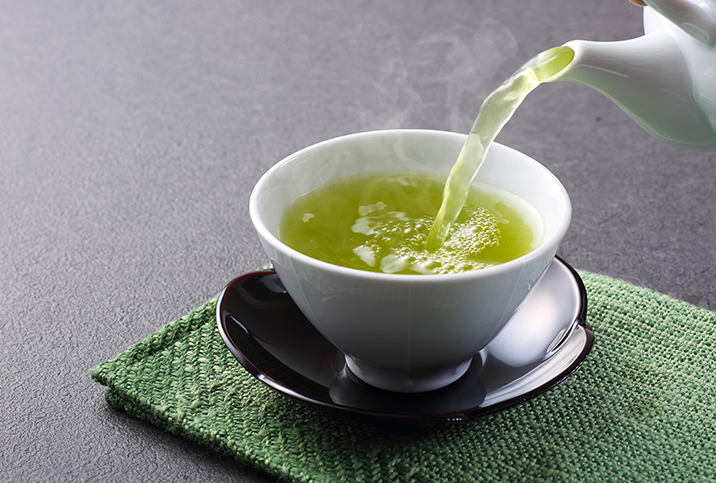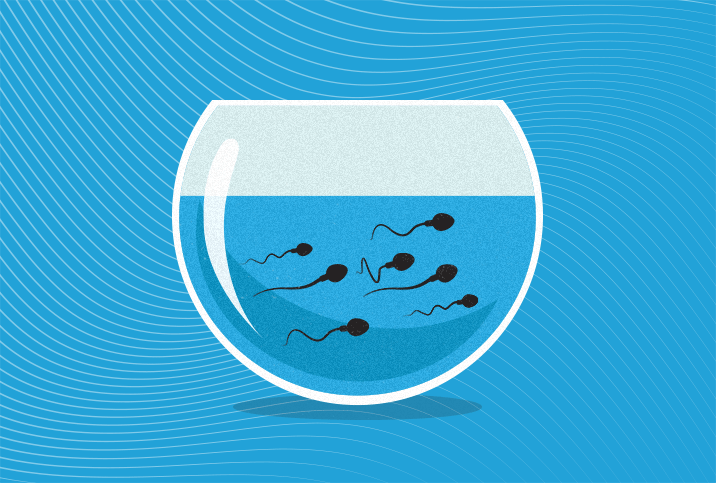Matcha Green Tea and Men's Fertility May Be Connected

The world's second-most popular beverage, tea, has been integral to many cultures for thousands of years. It is treasured for its taste as much as its health benefits, and now tea and men's fertility might be connected, likely through tea's influence on sperm count and motility, according to recent research.
First things first: No matter how you take it, proper tea is that which comes from the tea plant, or Camellia sinensis, an evergreen shrub indigenous to East Asia. Most herbal "teas," including those marketed as fertility supplements, don't contain Camellia sinensis. Though ingredients like ginseng and maca can be beneficial, they're not the same, according to the recent research published in Chemosphere.
Tea made from Camellia sinensis comes in six varieties, each of which is produced differently, giving them distinct taste, appearance and potential health properties:
- Green tea, widely considered the most healthful, is minimally processed, allowing it to retain its fresh flavor and natural compounds.
- White and oolong teas are slightly more oxidized.
- Black tea is fully oxidized.
- Pu-erh is a rare, fermented variety.
- Even rarer is yellow tea, which is produced similarly to green tea but much more slowly to generate its characteristic color.
Why tea is good for you
The tea plant contains more than 500 compounds, with some of the most beneficial being amino acids and polyphenols, especially catechins such as Epigallocatechin gallate (EGCG). Ample evidence shows polyphenols have several helpful properties, including antimicrobial, anti-inflammatory, antiangiogenic, antioxidative, antiatherosclerotic and anticancer.
"Antioxidants neutralize free radicals, unpaired electrons that can bind to your cell's genetic material or cellular structures," said Leann Poston, M.D., a Dayton, Ohio-based physician at Invigor Medical. "They help protect your cells from environmental harm."
Why matcha green tea is good for you
Matcha is made from powered green tea leaves. The drink is rich in vitamin E, which boosts a natural antioxidant important to sperm cell growth and protein production.
Research demonstrates antioxidants can reduce the risk of various ailments, including cancers, diabetes, cardiovascular disease and neurological disorders. They may also improve reproductive health. EGCG, for instance, may protect testicular tissue against oxidative damage and improve sperm concentration and motility.
Matcha green tea is also rich in vitamin E, which promotes sperm health by boosting production of glutathione, another natural antioxidant important to sperm cell growth and protein production, according to Naheed Ali, M.D., a New York-based contributor to USA Rx, a digital health marketplace.
What a tea for male fertility study found
In the past few years, two published studies have illustrated the effects of tea for male fertility.
The most recent, published in 2022 in Chemosphere, examined the effects of long-term tea drinking on semen quality in healthy Chinese men ages 22 to 45. The 1,385 participants provided 6,466 total semen samples over three months. Researchers examined the samples' physical characteristics and asked participants to complete questionnaires regarding their sociodemographic parameters and lifestyle, including tea drinking, smoking and alcohol consumption habits.
Participants were characterized as tea drinkers and non-tea drinkers; more than half of the tea drinkers smoked and occasionally drank alcohol.
Based on the analysis, researchers found tea drinkers had higher sperm concentration—the number of sperm per volume—and total sperm count compared with non-tea drinkers. They also had lower sperm motility, or the ability of the sperm to move through the female reproductive tract. However, those who drank green tea, specifically, had slightly better sperm motility than non-tea drinkers.
"Around 15 million sperm are released in a single ejaculation and at least 32 percent of those need to reach the egg for a chance of successful fertilization," explained Nicolas Darazi, M.D., a fertility consultant in Beirut for NOW-fertility, a digital reproductive care company.
Participants who consumed tea regularly for 10 years had the highest sperm concentrations: 16.27 percent more than non-tea drinkers. Among occasional alcohol drinkers, drinking tea three or more days per week correlated with higher sperm count and progressive motility.
What a green tea and fertility study in rats found
A study on male rats, published in 2020 in Scientific Reports, produced similar results. Researchers at the University of Limpopo in South Africa compared semen from rats that consumed a 2 percent or 5 percent aqueous extract of green tea for 52 days—the length of the animals' spermatogenic cycle—with semen from those that drank only tap water. Again, researchers found green tea significantly increased sperm concentration and sperm vitality.
Specifically, the results indicated sperm vitality increased up to 40 percent and 54.8 percent in rats that drank 2 percent and 5 percent green tea, respectively. Meanwhile, total static (nonmoving) spermatozoa decreased significantly, while the percentage of acrosome-reacted sperm significantly increased.
The study's lead researcher, Chinyerum Opuwari, Ph.D., a senior lecturer at the University of the Western Cape, explained in an email that many factors contribute to sperm's ability to fertilize an egg, including the number of sperm and how fast they swim. Those that can't reach their destination typically quickly die en route.
"Also, they undergo some changes [conditioning] within the female reproductive tract before they can fertilize an egg. One of those changes is called the acrosome reaction," Opuwari wrote. "During acrosome reaction, some enzymes are released from the head of the sperm, which help to digest the glycoprotein layer that surrounds the egg's plasma membrane [zona pellucida] and facilitate the fusion of the sperm with the egg. The current study thus showed that the green and black tea enables the functioning of the sperm and can play a role in fertilization."
Opuwari, whose focus is finding affordable, alternative means of treating infertility, said more research involving human subjects is needed. Since the 2020 study, she and her colleagues completed another trial examining the effects of green tea on human sperm. The report, slated to publish later in 2022 in the Journal of Medicinal Plants for Economic Development, will bolster other findings regarding green tea's positive effect on human sperm.
"Further in vivo studies with humans are required to indicate the amount of tea to be consumed and the duration," she said. "Furthermore, fertility studies with human subjects will be beneficial to conclude on the fertility outcome following tea consumption."


















